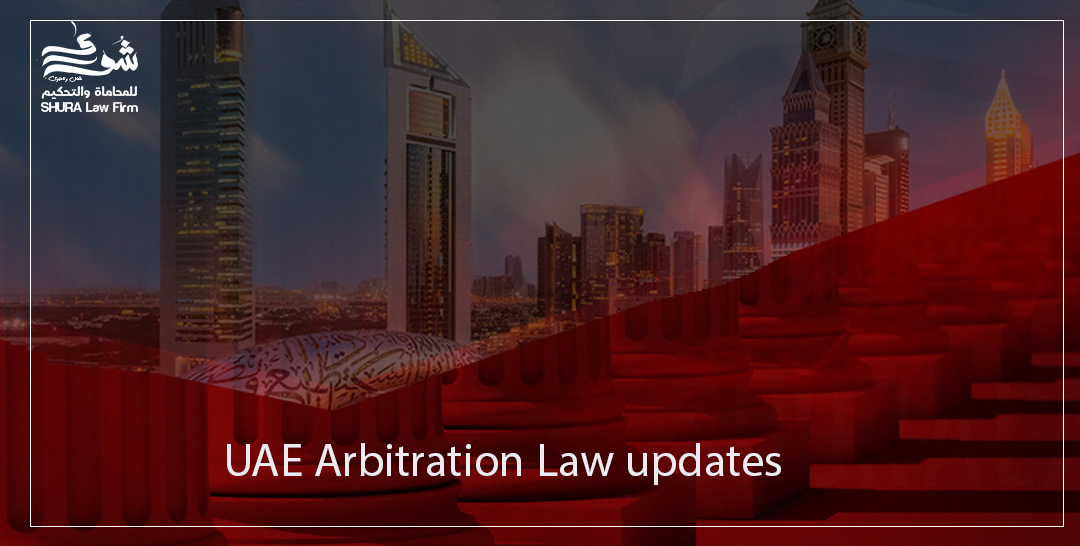UAE Arbitration Law updates
The United Arab Emirates recently published a new Federal decree-law No. 15 of 2023. Amending provisions of Federal Arbitration Act No. 6 of 2018.
The amendment introduced some important changes to the arbitration system in the United Arab Emirates, with the aim of enhancing its efficiency, flexibility, and attractiveness to domestic and international parties.
The amendments dealt with several important topics, including:
- The conditions to be met by the arbitrator
- Determination of procedures to be followed
- Acts and Place of Arbitration
- Arbitration Acts and Hearings
- Terms of appointment of an arbitrator who is a member of the Board of Trustees, the executive management, or the administrative apparatus of the arbitration institution concerned with organizing the arbitration
An important amendment in Federal Decree-Law No. 15 of 2023 was the emphasis on the scope of the Arbitration Act in relation to virtual and electronic arbitration proceedings. Article 28 of the Decree affirms the parties’ right to agree on and place arbitral acts, whether physical or virtual, through modern technological means or in technical environments.
If the parties do not agree, the arbitral tribunal has the power to decide on the method and place of arbitration, given the circumstances of the case and the appropriateness of the location for the parties.
Arbitration institutions are responsible for providing the technology necessary to conduct arbitration proceedings by modern technological means or within technical environments, by the country’s technical standards and regulations.
This amendment greatly helps to save the time and cost incurred by the parties to the dispute and the members of the arbitral tribunal to move to the place of arbitration, thereby enhancing one of the fundamental features of arbitration that distinguishes it from other means of dispute resolution, which is the speed in proceedings.
The easing of restrictions on the appointment of arbitrators from the supervisors or controlling bodies of the arbitral institution is also one of the most important amendments. The UAE’s aim in this amendment was to increase the pool of qualified and experienced arbitrators available to select parties.
It also promotes respect for party autonomy and freedom in the selection of arbitrators. Article 10 of Federal Decree-Law No. 15 of 2023. Provides for an exception to the general rule prohibiting the appointment of an arbitrator who is a member of the Board of Trustees, the Executive Directors, or the administrative organ of the arbitral institution concerned with the organization of arbitration.
The exception allows the parties to appoint such an arbitrator if certain conditions are met, such as the written consent and acknowledgment of the parties, and if the regulations of the arbitral institution competent to regulate the claim do not preclude this, the arbitrator shall not be an individual or a president of the arbitral tribunal, the disclosure of the arbitrator’s membership, the reduction of the number of arbitral cases that the arbitrator may hear in one year, and Decree-Law No. 15 of 2023 require the arbitral institution to have a special governance system and a secure reporting mechanism to ensure the separation of the arbitrator’s duties and impartiality and to prevent any conflict of interest or preferential advantages.
The amendments strengthened the powers of the arbitral tribunal to determine the procedures to be followed in the arbitration. Article 23 of Decree-Law No. 15 of 2023 affirmed the right of the parties to agree on the procedures to be followed by the arbitral tribunal in the conduct of the arbitration, including subjecting such proceedings to the rules implemented in any organization or arbitral institution, whether within or outside the country. However, if the parties do not agree on the procedure, the arbitral tribunal shall have the power to determine the appropriate procedure, taking into account the law, the fundamental principles of justice, and the international conventions to which the country is a party.
Article 33 of Decree-Law No. 15 of 2023 also emphasized the arbitral tribunal’s discretion to decide whether to hold oral hearings to present evidence or oral proceedings, or whether to proceed based on sufficient documentation and any other material evidence.
The arbitral tribunal shall also have the necessary flexibility to decide to hold such hearings at an appropriate stage of the proceedings at the request of a party. Furthermore, the arbitral tribunal has the discretion to determine the rules of evidence to be followed if the applicable law lacks the rules of evidence necessary to adjudicate the dispute, provided that these rules do not conflict with public order.
The arbitral tribunal may also decide on the admissibility and weight of evidence submitted by any party in respect of a fact or expert opinion and determine the time, manner, and form in which such evidence is exchanged between the parties and how it is presented. This change reflects the emphasis on recognizing the role and responsibility of the arbitral tribunal in ensuring the efficiency, results, fairness, and quality of the arbitration process.
It also enables the arbitral tribunal to adopt the most appropriate procedures and rules of evidence in each case, taking into account the expectations of the parties, the nature and complexity of the dispute, and the applicable legal framework.
However, this amendment also emphasizes certain obligations and challenges that the arbitral tribunal must address, such as ensuring respect for the parties’ rights and interests, compliance with due process and public order requirements, and avoiding any undue delays or costs.
The arbitral tribunal should therefore exercise its discretion in a reasonable and balanced manner and in consultation and cooperation with the parties and the arbitral institution.
It should be noted that these new amendments to the United Arab Emirates Arbitration Act were discussed for the first time at the Fourth Arab Arbitration Conference, sponsored by Shura Law and Arbitration Firm and organized by the International Academy for Mediation and Arbitration on 29:30 September 2023 in Cairo.



